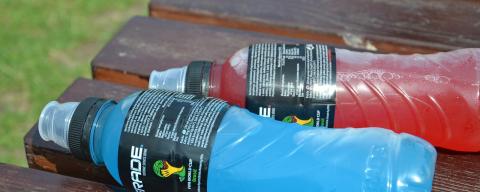Hydration: Are Electrolyte Drinks Better Than Water
Electrolyte drinks have become increasingly more popular over the years. Whether it’s after an intense exercise, recovering from illness, or just casually sipping throughout the day, you can find someone drinking an electrolyte beverage anywhere. There are plenty of different ways that electrolyte drinks are marketed towards the public; in powders to mix, tablets to consume with water, or premixed beverages. The most common claim of electrolyte drinks is that they can help improve physical performance and rehydrate/recover.
What are electrolytes and what is their purpose?
Electrolytes are essential minerals found in blood, sweat, and urine. These minerals can be obtained through food and beverages.
The main electrolytes in the body include:
- Sodium
- Potassium
- Magnesium
- Phosphate
- Chloride
These electrolytes are important for regulating the balance of fluids inside and outside of cells, maintaining nerve and muscle function, regulating blood pressure, and much more1. The amount of minerals one needs to consume to maintain healthy levels is based on several different factors including age, physical activity level, health status, or pregnancy/breastfeeding2.
Dehydration
Mostly everyone has experienced dehydration at some point in their lives. Dehydration is the result of losing more fluids than one is taking in. This could be from extreme/prolonged sweating, vomiting, diarrhea, etc. When losing fluids, electrolytes are leaving with those fluids. For example, the primary electrolyte lost though sweating is sodium. The most common symptoms of dehydration are thirst, fatigue, muscle spasms, cramping, dizziness, confusion, and dark-colored urine3,4,5.
Electrolyte drinks: when they’re necessary
All electrolyte drinks are different, so it is important to read labels prior to purchase. Some have a higher or lower amount of electrolytes in them and some are even considered supplements (which are not regulated by the FDA) so they do not contain nutrition labels. A few studies have shown that electrolyte drinks do hydrate better than regular water3,4, but are they necessary?
The answer: only in some circumstances.
Electrolyte drinks can be beneficial for someone who is enduring very intense exercise (75+ minutes) or when it is extremely hot in the workout environment. Electrolyte drinks can also be beneficial for someone who is very ill and is experiencing prolonged sweating, vomiting, or diarrhea. Vomiting and diarrhea results in the loss of fluids so it is important to replenish after experiencing these. If you are not sick, and only working out for an hour or less, water will work just fine for recovery1,3.
Can electrolyte drinks be harmful?
The answer: sometimes they can be.
Since the main electrolytes found in these drinks are sodium and potassium, this might be dangerous for someone who has Hypertension (chronic high blood pressure) or is salt-sensitive. This is because sodium draws water into the bloodstream, increasing the volume of blood which raises blood pressure.
Electrolyte drinks are not meant to be casually consumed throughout the day as if they’re water. Due to their high electrolyte content, drinking these beverages every day when there has not been a loss of electrolytes, could result in toxicities (poisoning) of different electrolytes. High potassium levels can cause vomiting/diarrhea resulting in dehydration6. Ironic right? Another reason electrolyte drinks should be avoided when there has not been a loss of electrolytes is because those drinks tend to be high in sugar. For someone who has lost electrolytes, sugar can be beneficial in helping them to recover; however, for the average person, that much sugar is not necessary and can be harmful for some people, especially someone who has diabetes.
In conclusion, electrolytes play a very important role in our daily lives. Electrolyte drinks play a role in replenishing lost fluids; however, they are only needed in specific situations and are not necessary for the average person on the average day.
References
- Cleveland Clinic. (2019, April 12). Electrolyte Drinks: Beneficial or Not? Health Essentials from Cleveland Clinic. https://health.clevelandclinic.org/electrolyte-drinks-beneficial-or-not/
- MediLexicon International. (n.d.). Daily Intake of vitamins and minerals: What to know. Medical News Today. Retrieved March 28, 2023, from https://www.medicalnewstoday.com/articles/vitamin-dosage
- August 21, Wellness, 2019 |, & Prevention. (2011, July 7). Do You Need an Electrolyte Drink? Scripps Health. https://www.scripps.org/news_items/3988-when-to-pick-electrolyte-drinks-over-water
- Millard-Stafford M, Snow TK, Jones ML, Suh H. The Beverage Hydration Index: Influence of Electrolytes, Carbohydrate and Protein. Nutrients. 2021;13(9):2933. Published 2021 Aug 25. doi:10.3390/nu13092933
- Harris PR, Keen DA, Constantopoulos E, et al. Fluid type influences acute hydration and muscle performance recovery in human subjects. J Int Soc Sports Nutr. 2019;16(1):15. Published 2019 Apr 4. doi:10.1186/s12970-019-0282-y
- Mayo Foundation for Medical Education and Research. (2022, November 8). High potassium (hyperkalemia) when to see a doctor. Mayo Clinic. Retrieved March 28, 2023, from https://www.mayoclinic.org/symptoms/hyperkalemia/basics/when-to-see-doctor/sym-20050776
Check Out Our New Health & Well-Being Page
Our specialists help create healthy people and healthy places in New Hampshire.
Featured LINK
Mental Health Resources for New Hampshire - a printable county-specific guide to help New Hampshire residents find local, state, and national mental health resources.

